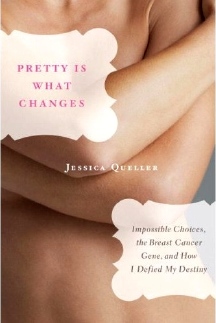We generally count on those who dispense technology to guide us with
regards to the choices we're presented. This is particularly true with
regards to medicine. We go to the doctor, get a diagnosis and a treatment
is prescribed. We follow the prescription, and expect a cure. But we're
enmeshed in technology that is moving faster than our ability to know
precisely how to use it. The decisions are no longer the province of
the experts; the patient may be called upon to choose the cure.
Jessica Queller found herself in the most extreme example of this conundrum
imaginable. Distraught and distracted by the deaths of both her grandmother
and her mother, she decided to submit her blood for a genetic test to
determine if she had the BRCA gene, a marker that indicates an almost
certain disposition to develop breast and / or ovarian cancer. She was
pretty certain that there would be no problem. There was no extensive
history of cancer in her family. She'd check the box off, be fine and
go about the rest of her life as a young woman, working as a writer
for television dramas in Hollywood. She never heard back and managed
to get a doctor on the phone, who told her that she did indeed have
the BRCA gene; she had an 87% chance of developing breast cancer.
'Pretty Is What Changes' is Queller's compelling memoir of death, disease
and ultimately, life. She juggles the order a bit, starting when she
received the news that she possessed the BRCA gene, and then backtracking
to her grandmother's and eventually, her mother's death. From there
on, she takes the reader step by step through a harrowing journey past
the borders of science and society. There are no easy answers; there
are lots of difficult questions. Her journey is thrilling, terrorizing,
poignant and powerfully well-written without ever slipping into sentiment
or bathos. Crisp prose brings the reader face to face with decisions
beyond the safety net.
'Pretty Is What Changes' has many strengths, but everything arises from
Queller's prose. She writes with straightforward clarity and lacerating
honesty. Reading this book, I never felt as if I were being hit up for
sympathy, or beseeched for understanding. Queller earns sympathy by
writing well, not by virtue of what she's writing about. She makes the
decisions she faces understandable to the lay reader because she herself
was very much a layperson before being immersed in the world of cancer.
Where readers are doubtful she is as well, and as her doubts are resolved,
so are ours. It's a difficult line to tread. Some of the material requires
that she reveal emotion, and she manages to convey powerful feelings
without sliding into sentiment. Clean, stripped down prose does the
trick, and makes this book a joy to read.
Queller is also a skilled storyteller, structuring her work to provide
tension, humor and all the aspects of a good novel without writing fiction.
There's a driving pace here that makes reading the book enjoyable even
when the events are traumatic. The humor is dark and plentiful. You'll
find yourself laughing a lot more than you might suspect given the frightening
subject.
Faced with a life-changing problem, Queller is a resourceful researcher,
and much of the joy in the book lies in following her journey along
the edges of science. She knows how to convey the raw information we
desire in an entertaining manner, always helped by her skills as a prose
writer. The dilemma at the heart of the book – whether or not
to get a prophylactic double mastectomy – could easily be made
to seem overwrought. By taking us through her learning process, a learning
process she herself sort of resisted, the resistant reader finds an
ally in the writer. We're in this together, and we care.
'Pretty Is What Changes' takes readers into lives that make the science-fictional
nature of our world startlingly clear. We have technology that strides
well beyond the established moral boundaries, that makes the impossible
possible. We're inclined to accept that the impossible is indeed that,
and as such it provides a natural moral boundary. But when those natural
boundaries are dissolved by advanced science, we must manufacture our
own morals. Jessica Queller's story is an example of one woman stepping
past science to embrace and create the world beyond.
